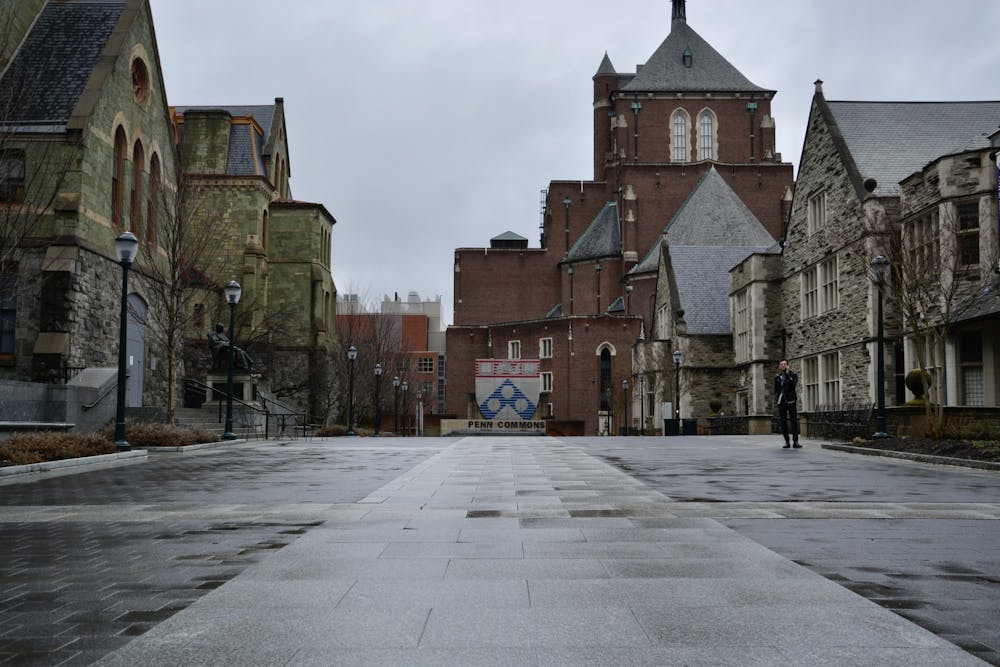
While Penn has decided to provide reimbursements for housing and meal plans, there have been no plans so far to offer tuition refunds.
Credit: Kylie CooperLast month, universities nationwide asked students to leave campus to limit the spread of the coronavirus. But several weeks into remote instruction, some students are demanding tuition refunds, asserting that online learning does not offer the same benefits as the in-person classes they are paying for.
Although Penn announced in an email to students and families on Thursday that those living in University housing or enrolled in a meal plan would be sent prorated reimbursements, some students are calling on the University to issue tuition refunds to compensate for the on-campus resources they no longer have access to and the absence of a traditional classroom experience.
Elsewhere, students and parents have filed class-action lawsuits against Drexel University, a fellow University City institution, the University of Miami, and public universities in Arizona.
The Drexel lawsuit alleges that despite the shift to remote learning, students are being unfairly charged for the on-campus experience and "activities and services that can only benefit students while students are on campus."
No lawsuit has been brought against Penn, but some students also feel that they are paying for on-campus benefits that they are not receiving.
“I paid for the environment itself, and now I’m not in that,” College sophomore Katharine Edwards said.
College sophomore Alyssa Gonzalez echoed Edwards’ sentiment.
“While the school has put measures in place to transition some resources to an online format, it doesn’t replace the value of having access to things in person,” Gonzalez said, citing resources such as libraries and academic help centers that students pay for in addition to their courses.
Some students are calling for tuition refunds because they feel that remote instruction has diminished the quality of their courses.
College junior Elizabeth Kim said one of her professors has canceled lectures completely, and she finds the lack of human connection disappointing.
She acknowledged that “faculty are also struggling with the transition personally and professionally,” adding that her professor canceled class because of family health struggles unrelated to COVID-19.
Kim, who has a hearing impairment, added that her other classes which are held on the Zoom video-conferencing application have been difficult for her because she cannot read people’s nonverbal cues to fill in missing gaps of information.
“I can’t tell who’s speaking, and by the time I identify the speaker, decipher her words, and process her message, the next person is already talking. It’s very hard for me to participate in class,” Kim said.
Kim added that a refund would help support families facing food insecurity, unemployment, and the unexpected costs of having college students home early as a result of the pandemic.
Wharton junior Felipe Gomez, who studied abroad in Madrid this semester at Universidad Pontificia Comillas, said that a remote education is not what he paid for.
“I feel like I’m in a course by myself right now. [My professors] are just sending me PowerPoints and telling me to do essays,” he said. “I’m barely learning anything.”
Gomez returned from abroad on March 16, four days after Provost Wendell Pritchett advised students studying abroad in Europe to return home immediately.
In one of College junior Ivy Liu’s classes, her professor has decided not to hold Zoom calls or record lectures but continues to give weekly assignments. In another class, Liu said the professor has not altered his exam or assignment timeline despite the University losing a week of instruction, giving students in the class less time to learn the required material.
Liu said she doesn't think teaching herself her course material is worth the cost of tuition.
College sophomore Amira Chowdhury, who thinks tuition refunds will especially benefit highly aided students, said her cramped two-bedroom apartment in California, occupied by her parents and grandmother, would not allow for her and her sister to comfortably participate in their Zoom classes. She currently resides at a friend’s off-campus apartment after Penn rejected her application to stay in her dorm.
“I don’t have the library anymore to go to and use the software that I need for some of my classes,” she said. “I don’t have printing anymore, and I don’t have [the Pan-Asian American Community House] or Civic House to obtain the resources I need.”
Even for students whose applications to remain on campus were accepted, resources such as libraries have shut down due to the spread of the virus.
Chowdhury said she feels Penn hasn't done enough to support highly aided students like herself amid the pandemic. She said a tuition refund would be beneficial in light of financial difficulties, especially since she does not qualify for a housing refund.
Penn’s housing refund policy states that students will get refunded “based on each family’s contribution toward the cost of attendance.” For Chowdhury, whose family contributes less than $50, housing will not be refunded.
College senior Justin Horn said he thinks tuition refunds could be feasible, although he admitted he does not know all of Penn’s financial intricacies.
“A lot of Penn’s expenses are running a campus, and a lot of the benefits of education are being on campus,” he said. “If there is a significant amount of money that Penn is saving because of this, then I don’t think it’s a legal obligation, but I think it is the morally right thing to do to refund some of the extra tuition money.”
Vice President for University Communications Stephen MacCarthy did not respond to multiple requests for comment.
The Daily Pennsylvanian is an independent, student-run newspaper. Please consider making a donation to support the coverage that shapes the University. Your generosity ensures a future of strong journalism at Penn.
Donate




